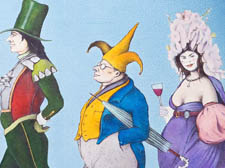|
|
 |
| |
 Cover illustration from Peter Ackroyd’s retelling of The Canterbury Tales Cover illustration from Peter Ackroyd’s retelling of The Canterbury Tales |
Retracing Chaucer’s steps along the Canterbury trail
Peter Ackroyd’s excellent retelling of The Canterbury Tales has a contemporary resonance, as its pilgrims pose some prescient questions, writes Illtyd Harington
The Canterbury Tales:
A Retelling by Peter Ackroyd.
Penguin Classics £25.
PETER Ackroyd has done it again, almost with ease. His version of Chaucer’s Canterbury Tales is faultless.
William Caxton, inventor of the printing press, called Geoffrey Chaucer (1342-1400), the “father of the English language”, bridging the gap between official French and an emerging English.
One bright April 1 a party of 29 pilgrims, Chaucer among them, set out from the Tabard Inn in Southwark, to ride to Canterbury and worship at the tomb of St Thomas Beckett.
Harry Bailey, the pub’s landlord, accompanied them on the long pilgrimage, and in order to make it more pleasant, he suggested each one told a story.
Twenty-four of them agreed and for several days and nights they discharged their promise.
They poured out an endless collection on human frailty as well as its nobility. Here you find pomposity, humility, vice, comedy, tragedy, love and lust. Eve and her sisters are the source of man’s fall from grace and suffering after the exit from paradise.
Honouring the old is commended while gluttony comes in for censure, but it is the humour – rich, salty and vulgar – which marks the stories of this 14th-century journey.
Many have a contemporary ring to them, and a portrait of medieval England appears.
The Wife of Bath stands out as an early version of liberated woman.
She poses the question: “What does a woman desire most of a man?”
Hunting for her sixth husband, she stipulates that it is to delegate all responsibility and authority to the woman.
The Clerk of Oxford, a humble priest, a man of gentility unlike the brash Wife of Bath, says: “Love grown old is not the same as new love.” How true, they all agree, as we do.
The Merchant recalls the nuptials of January and May: “Tender youth marries halting age.”
Bit it is the Nun’s Priest’s tale which gets my vote. A story of a strapping cockerel called Chanticleer and his favourite hen Dame Pertelote, who suffers terrifying nightmares of a violent death at the hands of something red. She reassures him from her wide reading of the classics that there is no need to worry. He too has read the classics of the ancient world, which have contributed to his morbid conclusion.
Chaucer was a survivor, but his irony and penetrating observations ring out for us with the good, bad and indifferent in our day. In his public life, he probably cooked the books. He was even accused of rape.
But he went on, seldom far from the centre of influence. His enjoyment of the vulgarity and earthiness of English life, his judgment and attitudes were engaged in reality.
This comes through in this superb retelling. They may have their fair share of hypocrites and rogues, but unlike modern camera-clicking pilgrims to Canterbury, they are individualistic, and not running for a bus. Ackroyd has served Chaucer well, but poses the question to the reader: “Can you depend on dame fortune? She is a very fickle mistress.”
He has served a full English breakfast, a dish to relish and repeat.
•
|
 |
|
|
 |
 |
|
 |
|
 Cover illustration from Peter Ackroyd’s retelling of The Canterbury Tales
Cover illustration from Peter Ackroyd’s retelling of The Canterbury Tales
